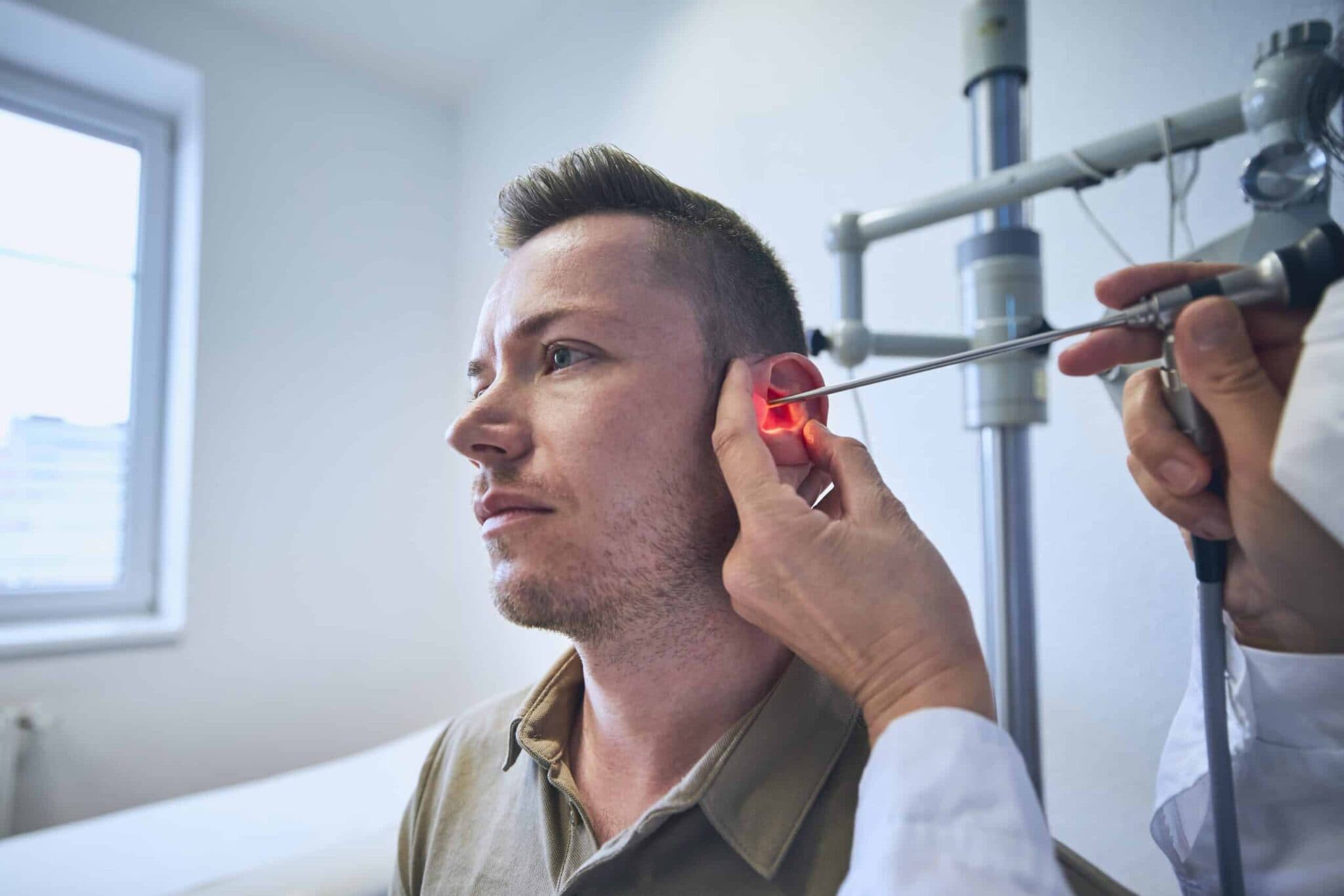A study of more than 1.6 million patients showed that traumatic brain injuries (TBIs) significantly increase the risk of hearing loss. In fact, patients suffering a brain injury have a 2.125 greater risk of developing hearing loss than individuals without brain injury.
An estimated 48 million Americans are already experiencing hearing loss. If you or someone you love has become one of these millions due to a head injury or personal injury accident, it is possible to seek compensation for your damages. The team at Weinstein Legal is ready to fight for your rights.
Why Can a Head Injury Cause Hearing Loss?
Hearing is a process that occurs in a split second, but involves many steps. The process begins when sound waves enter your outer ear; this is the part that’s visible on either side of your head. Next, the waves travel to your middle ear and hit your eardrum, which causes it to vibrate.
Here, sound waves reach one of the three small bones of the middle ear, the hammer. The hammer moves the anvil, another small bone, which moves the stirrup (yet another small bone), which transmits the vibrations to your inner ear. The waves travel through your auditory canal where auditory nerves and tiny hair cells convert the sound waves to nerve impulses that then travel to the brain. The brain then interprets the impulses into a recognizable sound.
Certain diseases or drugs, loud noises, or aging can damage the delicate hair cells of the ear, leading to hearing loss. However, brain injuries, constant loud noise, and injuries to the ear itself can damage either the small bones of the ear or the nerves which transmit waves to the brain, leading to hearing loss.
Types of Hearing Loss Injuries
There are two main types of hearing loss: sensorineural and conductive. Sensorineural hearing loss occurs when the central nerve, inner ear, or sound-processing portions of the brain are damaged. In this type of hearing loss, the nerves and brain are unable to process sound. This type of hearing loss can range from moderate to complete deafness.
Conductive hearing loss is caused when the ear’s ability to conduct sound into the inner ear is reduced or blocked. This can be a physical blockage, or can happen when the eardrum itself is perforated or ruptured through physical changes or damage. These cases can be temporary and are curable through appropriate medical intervention.
In some cases, hearing loss can be a combination of conductive and sensorineural. This occurs when an auto accident or workplace accident damages the inner, middle, and outer ear, including the auditory nerve of the inner ear. This hearing loss is both a mechanical issue as well as neural.
Sudden Hearing Loss Symptoms
When hearing loss is not caused by genetic or age-related causes, we refer to it as sudden hearing loss. This means that the gradual or immediate loss of hearing occurs after a traumatic event, such as a car accident.
Victims commonly experience signs such as:
- Muffled sounds
- Temporary loss of hearing in one ear
- Temporary loss of hearing in both ears
- Difficulty hearing or comprehending words
- Needing to raise the volume on electronics
- Persistent ringing in one or both ears, or tinnitus
- Consistently asking people to repeat themselves
In head injury hearing loss, these signs are often accompanied by the symptoms of a TBI, such as dizziness, headaches, blurred vision, and difficulty with concentration or memory recall.
What Causes Hearing Loss
As noted, loud noises found in the workplace can cause hearing loss. However, hearing loss after a head injury is increasingly common. Patients with traumatic brain injuries are more than two times as likely to develop hearing loss than individuals without a TBI. However, patients suffering a TBI due to an auto accident have the highest associated risk of hearing loss.
Different factors that can contribute to hearing loss after a head injury include:
- Loud Noises: The vibration from the sound of a car crash can severely injure the eardrum, and may cause permanent damage.
- Brain Trauma: The auditory cortex in the brain can be damaged during an auto accident, a severe fall, or other blunt forces that damage the brain.
- Cochlear Damage: The cochlea is located in the inner ear and helps to convert sound waves to nerve impulses that then travel to the brain. Damage to this sensitive structure can be sustained during a head injury or from high decibel levels.
- Injury to the Eardrum: During high impact auto accidents, such as rollover or head-on collisions, debris showers over a victim. Sharp material can pierce or damage the inner ear.
Tinnitus after a head injury is also very common, and can be caused by a sudden loud noise or damage to either the cochlea or eardrum. When experiencing tinnitus, one has a ringing in the ears sensation in one or both ears which is frequently accompanied by dizziness. Symptoms can be constant or can be triggered depending on the setting.
Compensation Claims for Hearing Loss
If you’ve suffered hearing loss following a personal injury accident such as a car crash, you’re not alone. At the Weinstein Legal Team, our dedicated team of personal injury attorneys is available 24/7 to fight for your rights to compensation. If you’ve been robbed of one of your senses due to the negligence of another, time is of the essence to file for damages.
Loss of hearing or deafness damages typically consist of:
- Lost wages
- Medical fees
- Pain and suffering
- Loss of quality of life
- Permanent loss of income
- Ongoing or future medical care
Fill out a free case evaluation form today to begin discussing the compensation you could be owed following hearing loss.
Recovering Compensation Due to Hearing Loss
While sensory loss, such as hearing loss after a head injury, or other injuries, such as tinnitus after a head injury, can cause costly expenses that can weigh on a victim emotionally and financially, certain standards are in place to seek compensation. Regardless of the event that caused the hearing loss, the event must have been one you did not willingly submit to.
For instance, if loud noises at a fireworks show you willingly attended caused hearing loss, you have a slim chance of recovering damages. However, you may be liable for compensation if you were involved in an auto accident or slip and fall that was of limited- or no fault of your own.
Loss of hearing does not need to be total or permanent to recover damages. To recover, the victim must prove that their hearing was unaffected prior to the at-fault’s party actions, that the action caused a hearing loss, and that the victim incurred expenses due to the hearing loss.
If you’ve suffered hearing loss due to another’s negligence, contact the attorneys at Weinstein Legal Team today. Working together, we can review your medical records, the facts of the case, and discuss the types and amounts of compensation you maybe be liable to receive in a claim. They may have taken your hearing, but the attorneys at Weinstein Legal Team will help you seek justice.















